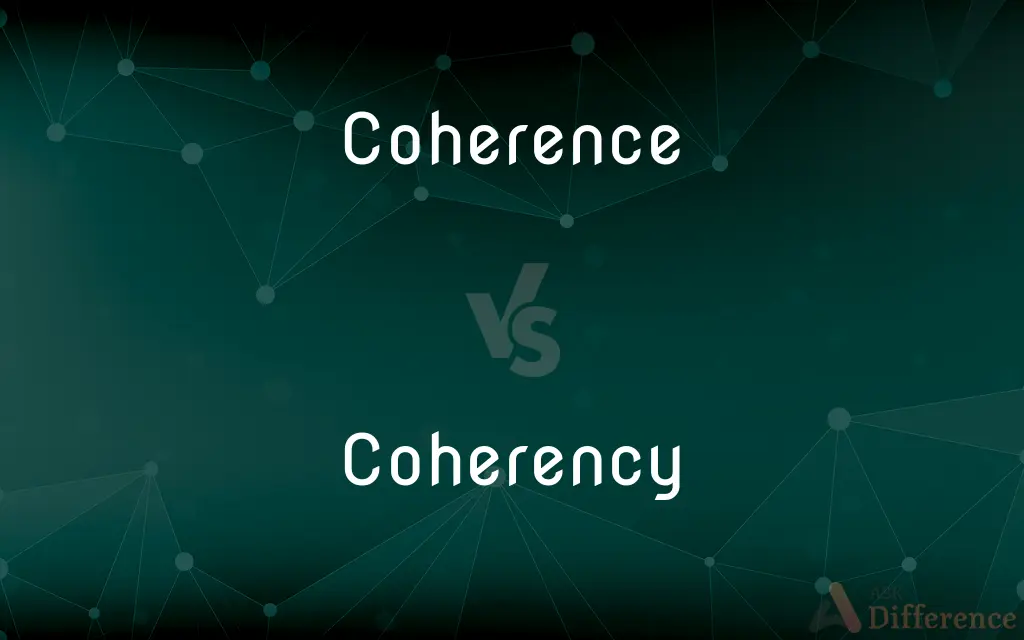Coherence vs. Coherency — What's the Difference?
By Tayyaba Rehman & Urooj Arif — Updated on April 27, 2024
Coherence refers to the logical, consistent connection between ideas, whereas coherency is a less common variant of coherence, often used interchangeably but can imply the quality of being coherent.

Difference Between Coherence and Coherency
Table of Contents
ADVERTISEMENT
Key Differences
Coherence refers to the logical and orderly relation of parts in a text or discourse, making it clear and easy to understand. Whereas coherency, often considered a synonym, can emphasize the quality or state of elements being coherent.
In writing, coherence ensures that all parts of the text are connected and flow smoothly from one to the next. On the other hand, coherency might be mentioned when discussing the characteristics of something that maintains this logical connection consistently.
Coherence is crucial in structuring arguments or narratives to make them comprehensible to the reader or listener. Coherency, while essentially conveying the same idea, is used less frequently and might focus more on the abstract quality of coherence.
The term "coherence" is preferred in technical contexts such as physics and linguistics to describe consistency and clarity in patterns and structures. Whereas coherency might appear in more general discussions about clarity and logical structuring.
Coherence is about making an entire system, such as a text or a set of ideas, logically aligned. Conversely, coherency might be invoked to describe the degree to which something is coherent, reflecting its condition or quality.
ADVERTISEMENT
Comparison Chart
Definition
Logical connection and consistency in parts
Quality or state of being coherent
Common Usage
Preferred in academic and technical contexts
Less common, more abstract
Focus
On practical application in text or theory
On describing the characteristic of coherence
Associated With
Texts, arguments, systems
Ideas, theories, general discussions
Implication
Structured, clear communication
The inherent quality of coherence in something
Compare with Definitions
Coherence
Unity or integrity in thoughts, ideas, or parts.
The novel’s narrative coherence won acclaim from critics.
Coherency
Continuity of thought and purpose.
The coherency of his lectures made them exceptionally rewarding.
Coherence
Cohesion in various parts of a complex process or system.
He explained the coherence among the different stages of the project.
Coherency
The quality of being logical and consistent.
His speech lacked coherency in several key points.
Coherence
Consistency and orderly flow of connected elements.
The document lacked coherence, making it difficult to understand.
Coherency
Clear and orderly presentation of ideas.
She was awarded for the coherency of her presentation.
Coherence
Logical interconnection; overall sense or understandability.
The coherence of her argument made it easy to follow.
Coherency
Consistency in a theory or argument.
The philosophical text is notable for its coherency.
Coherence
Harmony in aesthetic or functional arrangements.
The coherence in the design of the building was praised.
Coherency
State of cohering or sticking together.
The coherency of the team's defense won them the game.
Coherence
The quality or state of cohering, especially a logical, orderly, and aesthetically consistent relationship of parts.
Coherency
Coherence.
Coherence
(Physics) The property of being coherent, as of waves.
Coherency
The state of being coherent; a coherent relationship.
Coherence
The quality of cohering, or being coherent; internal consistency.
His arguments lacked coherence.
Coherency
The state of cohering or sticking together
Coherence
The quality of forming a unified whole.
Coherency
Logical and orderly and consistent relation of parts
Coherence
A logical arrangement of parts, as in writing.
Coherence
The property of having the same wavelength and phase.
Coherence
A semantic relationship between different parts of the same text.
Coherence
A sticking or cleaving together; union of parts of the same body; cohesion.
Coherence
Connection or dependence, proceeding from the subordination of the parts of a thing to one principle or purpose, as in the parts of a discourse, or of a system of philosophy; a logical and orderly and consistent relation of parts; consecutiveness.
Coherence of discourse, and a direct tendency of all the parts of it to the argument in hand, are most eminently to be found in him.
Coherence
The state of cohering.
Coherence
The state of cohering or sticking together
Coherence
Logical and orderly and consistent relation of parts
Common Curiosities
What is the difference between coherence and coherency?
Coherence refers to the logical connection in elements, while coherency is often about the quality of being coherent.
How can one improve the coherence of a text?
By organizing ideas logically, using clear transitions, and ensuring all parts contribute to the overall message.
Are coherence and coherency synonymous in philosophical discussions?
They can be, though coherency might focus more on the abstract quality of a coherent argument.
Is coherency just a less common term for coherence?
Yes, coherency is less commonly used and often interchangeable with coherence but can emphasize the abstract quality.
Can a text have coherency without coherence?
No, coherency generally implies the presence of coherence.
What role does coherence play in scientific explanations?
It helps to present information in a logical, connected way, crucial for clarity and understanding.
Why is coherence important in writing?
Coherence makes writing clear and understandable, ensuring that all parts connect logically.
Does coherency apply to spoken language?
Yes, coherency is important in spoken language to ensure clarity and logical flow of ideas.
Can visual presentations benefit from coherence?
Yes, visual coherence ensures that all elements are harmoniously arranged and easy to interpret.
What is an example of lacking coherence in a practical situation?
If a team's project plan is disjointed and the tasks are not logically ordered, it lacks coherence.
Share Your Discovery

Previous Comparison
Ontological vs. Ontic
Next Comparison
Edge vs. NickAuthor Spotlight
Written by
Tayyaba RehmanTayyaba Rehman is a distinguished writer, currently serving as a primary contributor to askdifference.com. As a researcher in semantics and etymology, Tayyaba's passion for the complexity of languages and their distinctions has found a perfect home on the platform. Tayyaba delves into the intricacies of language, distinguishing between commonly confused words and phrases, thereby providing clarity for readers worldwide.
Co-written by
Urooj ArifUrooj is a skilled content writer at Ask Difference, known for her exceptional ability to simplify complex topics into engaging and informative content. With a passion for research and a flair for clear, concise writing, she consistently delivers articles that resonate with our diverse audience.
















































